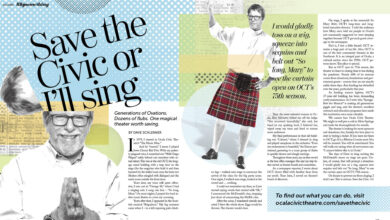Maddening. Havoc. Devastating. These are just a few words that have been used by people held hostage by the mind disease known as Bipolar Disorder.
Story: Kelli Fuqua Hart
Sometimes called manic depression, bipolar mood disorder and bipolar affective disorder, this mental illness has its grasp on approximately 5.7 million adult Americans and is the sixth leading cause of disability in the world.
Imagine waking up in the morning feeling refreshed, sipping on a cup of coffee as you plan your day and head out, focused, to your office. You arrive to work, nod “good morning” to co-workers and have a head full of bright ideas and resolutions to the day’s tasks. You feel energetic, monumental, endless. But, somewhere along the way, and without warning or reason, you become restless. Your mood shifts. Your mind shuts down and it’s almost as if your limbs don’t want to move. Suddenly, you experience feelings of meaninglessness, irritability and boredom. You want to drive off to nowhere or smash something. You want to escape your own skin and find yourself a new life.
Now, imagine having this internal, uncontrollable, back and forth struggle every day, maybe throughout the day. This is what life is like for an individual battling with Bipolar Disorder.
“Every day is different. Things that may trigger me may not trigger everyone else. Sometimes, it can be as simple as a customer with a bad attitude, a sad song or movie that causes me to struggle. The movie “Perks of Being a Wallflower” made me cry for days. I sobbed. I couldn’t get out of bed. I wanted to die. And then I remembered my family, my husband, and asked ‘what would my death do to him? My kids?’ I know how my dad’s death affected me and I could never intentionally do that to them.” –Angie, Ocala resident, 35 Years Old
WHAT IS BIPOLAR?
Described in the DSM-V, the Diagnostic and Statistical Manual of Mental Health Disorders, Bipolar Disorder is a “cyclic” or “periodic” illness, meaning patients “cycle up” into a manic or mixed-manic episode and later “cycle down” into a depressive state.
Although not a discriminating illness, bipolar symptoms or tendencies typically occur, be it as a manic episode or a depressive episode, somewhere in the teens or early twenties. Earlier onsets, including children 10 years of age or less, and later onsets in seniors aged 70 or more, have occurred, although rare.
“Mania” comes with such a stigma and is what people refer to as the “madness” or the “mayhem” of the disease. Cardinal symptoms of mania include euphoria, flight of ideas, increased energy, pressure of speech, a decreased need for sleep, hyperactivity and irritability.
In acute mania, these symptoms may be joined by delusions, fragmented behavior and oftentimes, bizarre psychotic symptoms.
Mania’s nemesis, depression, usually rears it’s ugly head through signs of psychomotor retardation (a slowing-down of thought and a reduction of physical movements), hyperphagia (an obsessive and compulsive behavior towards food) and hypersomnolence (excessive daytime sleepiness (EDS), or prolonged nighttime sleep), oftentimes accompanied by delusions or hallucinations. Untreated, these episodes of depression typically last 6 months or longer.
Because there are roughly 27 million people worldwide who are affected by Bipolar Disorder, it’s a hot topic for research and debate. Studies on the brain and how bipolar “works,” how genetics play a role and how to potentially prevent or at least treat this disease, are being conducted every day.
RELATIONSHIPS
It goes without saying, that any mental illness poses a threat to intimate, personal and professional relationships. Bipolar Disorder is no exception to this rule, in that it too can seriously complicate relationships.
“Bi-polar has nearly ruined my marriage of 20 years. It is only by the grace of God that my husband hung on and didn’t give up on me. I gave him more reasons to go then to stay. He was the one constant person I could depend on to pick up the pieces. After so much of a power struggle going on in my mind, I found a way to slow things down in my head a bit. I became a black out drinker trying to self medicate to stop my mind from racing out of control. I went from the occasional glass of wine to hiding bottles in places around my house. He never knew which wife he was going to come home from work to. Was I going to be the good wife that worked all day, had dinner prepared and the kids homework complete? Or was I going be drunk and passed out? I hate to say it, but it was the drunk, passed-out wife more than anything. This drinking and self-destructive behavior went on for about 4 years. I somehow pulled myself together enough to keep a job in the same profession for 20 years. I have always enjoyed my work and found it a nice distraction. It has been a way to escape the madness I live in outside of the office. I was fortunate to only have one run in with the law after a failed suicide attempt. That officer drove me to The Centers. That was the drive that saved my life in more ways than one.” – Nancy, Ocala Resident, Insurance Agent
Because one common symptom is impaired judgment, relationships can be threatened by the impulsive, unstable decisions a sufferer may make. For example, spending money recklessly, behaving promiscuously, engaging in risky behavior such as substance abuse and behaving criminally are all potential dangers.
Likewise, the depressive side of bipolar can cause a person to withdrawal completely from everyone and everything, making a partner or employer or friend become frustrated.
“In life, people consider you crazy. I have lost some friends due to things I have said but didn’t mean. It’s hard. In a career, you have to suppress yourself and almost try to block your feelings to get thorough the day. It puts strains on relationships when you are topsy-turvy in your moods. Sometimes, things are great. Other days, I don’t feel like I can stand myself.” – Samantha, Ocala resident, Mother and Student
Dating someone new poses many problems for bipolar patients. It’s natural to want to make a great first impression, so imagine how introducing the fact you suffer from bipolar may cause extreme discomfort and anxiety for the sufferer. Imagine the fears associated with running off a potential suitor simply because you have to eventually come clean with your illness. Or consider the alternative – not coming clean and allowing your partner to witness, first hand, the chaos and turmoil as you cycle up to a sense of mania.
HEALTH
A key player to the sustainability of balance life for those suffering with Bipolar illness is medication. Mood stabilizers such as Depakote, anti-anxiety pills such as Celexa and Welbutrin, an anti-depressant, are amongst some of the well-known psychotropic drugs prescribed to patients by physicians.
Because each sufferer and their symptoms are diverse, medications are prescribed based on specific need.
And with each brand of medication, comes a variety of potential side effects to include tremors, dizziness, nausea, dry mouth, blurred vision and more commonly, sexual dysfunction.
So, imagine having to not only manage the symptoms of bipolar, but to have to possibly endure the unpleasant side effects of the very things used to help make you “well.”
For most patients, the risks are worth it. Without medicinal help, their disorder would run their lives and potentially destroy them.
“Without medication, I can’t control my emotions. I get so overwhelmed with sadness and I cry at the drop of a hat. I am so irritable that it is hard to even be around me. I am so argumentative and can be down right mean. My thoughts are so out of control and I can’t turn my brain off. With my medication, I feel normal and have better control over my feelings and thought processes. My mind is not racing and I can function in my work environment and my family life.” – Nancy, Ocala Resident, Insurance Agent
For other individuals, medication is not an option, for one reason or another. Some people’s bodies can’t process the medications without harsh reactions, making it impossible to endure the side effects.
“My doctor prescribed to me Trazadone, Abilify and Strattera. I was excited to have something else in my back pocket that might make this go away or at least be manageable. Shortly after taking these meds, I felt worse. I lost weight, gained weight, shook and felt almost possessed. I’d bite my nails to where they bled. I felt like the medications were destroying in me the things my bipolar wasn’t. So, I’m left to manage my bipolar holistically, which is extremely difficult. Most days I feel like giving up and allowing my disease to in.” – Trish, Ocala Residence, 43 Years Old, Mother of 3
According to Psychologist Joyce Urban of the Urban Counseling Group in Ocala, “One of the biggest challenges in therapy is getting patients to stick to their medical regime. There are times when patients feel fine and believe they no longer need their medication.” Missing doses throws off a sufferer’s balance and can send them back in to a high or low state.
SUBSTANCE ABUSE
Studies have concluded, those afflicted with Bipolar Disorder have higher rates of relational problems, economic struggles, accidental injuries and sadly, greater risks of suicide than the general population. They are also significantly more likely to develop an addiction to alcohol or drugs.
According to statistics presented by the American Journal of Managed Care, about 56 percent of individuals with bipolar who participated in a national study had experienced drug or alcohol addiction during their lifetime. Of those that same group, 46 percent had abused alcohol or were addicted. Likewise, 41 percent had abused drugs or were addicted to drugs.
What’s the correlation? Why do so many sufferers do what is called “self medicating?”
“Powerful street drugs provide a much quicker and more potent sense of relief for the sufferer than does traditional prescription drugs,” according to Ryan Soave, M.A. of Spirit 2 Spirit Trauma, Training & Treatment in Ocklawaha, Florida.
Soave goes on to say, “These [street] drugs are often powerfully addictive and after this initial sense of relief, they actually make the symptoms worse and create a greater need and desire for even more drugs. Life becomes a series of extreme highs and lows depending on the substance or substances being abused.”
“My ups were high and my downs were low. I was dangerous when I was up. I was promiscuous and doing drugs. I did things I knew were wrong and just didn›t care. And my lows brought feelings of loneliness that no one else understood. I felt I was wrong. I felt like God was punishing me for the things I did when I was high, or maybe just because? I was on a path of destruction. I was drinking daily. As soon as the kids were in bed, I’d crack the bottle and get drunk by myself.” – Angie, Ocala Resident, 35 Years Old
Some sufferers need to escape their pain and their fears, their anxiety and their guilt and overall feeling of hopelessness. For some, drugs and alcohol are a world where there is no disorder and no suffering.
“I was diagnosed with bipolar when I was 14 years old. By 15, I was using marijuana to help clear the crazy thoughts that competed in my head. By 22, I was using cocaine and heroin, sometimes together in hopes it would kill me. When I was high, I felt cured. I figured it was better to be high than crazy. Or, better to be dead than suffering. Now, at 51 years old, I have gotten clean and manage my bipolar through controlled, prescribed medications. I have 5 children as a result of the decisions I made while I was high. I lost 6 jobs and now work in retail. I look in the mirror and see an 80-year-old woman, who is sad and lonely, looking back at me. And not a day goes by that I still don’t wonder if it’s not better to be high than crazy.” – Regina, Ocala Resident, 51 Years Old
THE GOOD NEWS
Amid all of the stigmas and misperceptions, truths and facts related to Bipolar Disorder, there is some good news.
Bipolar Disorder is manageable. It does not have to control you. It does not have to destroy your goals. It does not have to shatter your dreams of doing whatever it is you set out to do.
Successful management is attainable. “It is extremely important,” according to Urban, “to maintain a medical regime and surround yourself with the support of family and friends who understand the disorder.”
Actor Richard Dreyfuss, writer Ernest Hemingway, journalist Jane Pauley and singer, performer Frank Sinatra are among the many success stories of individuals who suffer(ed) from, manage(d) and have excelled, in spite of this disease we know as Bipolar Disorder.
Through physician supervision, counseling, medications, holistic and physical approaches to manage stress and anxiety, education and support systems, Bipolar Disorder can be something you have, not something that has you!
If you or someone you know wants more information on Bipolar Disorder, there are numerous and up-to-date resources online to include www.helpguide.org and local online support groups such as www.bipolar.meetup.com/cities/us/fl/ocala.






